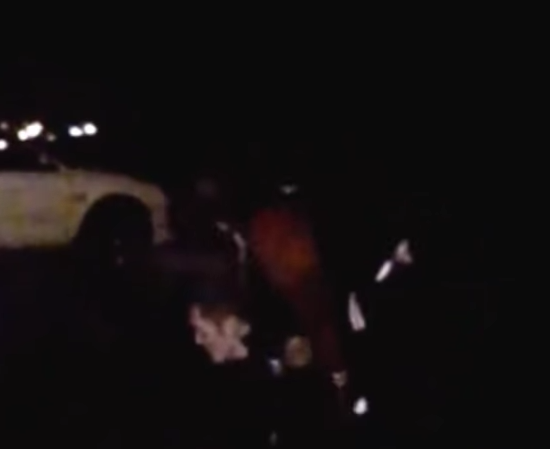This is horrifying.
You know the expression “I’d rather be lucky than good.”? Well, this officer was damn lucky.
I don’t know the officer or the training he received, but it sure looks like he hadn’t fully mentally or physically prepared himself to meet the 3%er (defined by BTS in the Spear System Trainer’s Manual as “a violent subject willing to injure or kill you to facilitate their escape”).
I never like to armchair quarterback confrontations. But we need to get vocal if we are going to make this profession safer.
Pointing Fingers: Who’s to Blame?
Let’s agree that there will always be predators. Then let’s agree that we need protectors, guardians, and warriors. If we agree, then the problem is simple: Departments need to get their acts together, and officers need to invest more in their fitness and practical tactical skills.
Departments: First and foremost I believe it’s the departments moral, ethical, and legal responsibility to make sure their officers are getting “realistic, relevant and rigorous” training. Real fights are no joke. These fights are different than regular arrest-and-control confrontations where someone is simply resisting arrest. The impact the sudden violent confrontation has on the limbic system and the rest of your physiology is critical. Officers must stress-inoculate before the fight, in solid training.
Individual officers: If you read the point above and vehemently agree, then chew on this: It’s also the officers responsibility to make sure that he or she is ready for the fight. Police work is inherently dangerous. If you’re a cop you need to think about, prepare for, and be ready for the worst-case scenario. And if your agency isn’t providing the training you know you need YOU need to augment it.
“Training should be a bloodless battle so that battle is just like bloody training.” —Roman Legion Maxim
It requires a forward-thinking administration to support realistic training, and then it requires motivated officers to show up (see previous two points). By the way: 30% of the officers that attend our SPEAR System course self-fund because their agency won’t pay. I admire them.
Back to the video.
What I Saw & Think
In a sudden fight you need to weather the ambush. If you don’t survive the ambush, you don’t get to use your complex motor skills. That’s how important the first two seconds are.
So it’s interesting to note that it was physiology and a reflexive flinch that got the officer away from the first sucker punch, but he wasn’t able to convert it and engage the threat. It’s more difficult to convert a flinch if you don’t first study physiology and how the body’s survival system can play an important role in close-quarter safety. After that, all hell broke loose.
After some schoolyard-style grappling, it went to the ground. We can’t see much of the action initially, but clearly the officer is not in control of the subject or the situation. When the felon got behind the officer and started wailing on him, it looked like the officer was fixated on protecting his gun since we don’t see him trying to strike at the suspect, grab at his fingers or hands during the choke.
What bothered me the most was the officer’s persistent cries for help. I was angry that this was happening to him and my adrenaline was pumping because he wasn’t fighting back. You could hear the fear in his voice.
“If you face just one opponent and you doubt yourself, you are outnumbered.”--Dan Millman, author, Way of the Peaceful Warrior
Following are some lessons for you to consider.
1. Do not presume compliance (reread my treatise, originally written in 1993, and make sure your officers read it too). Discuss it at roll-call.
2. We are human weapon systems. We are tougher and more resilient than we think. Look at the punches and elbows the officer took. He stayed in the fight and that ultimately saved his life until backup arrived.
3. Think about what it could cost you if you don’t fight back. This is another part of our training where we look at confrontations from the emotional and personal perspective rather than from techniques and counters. You need to weather the ambush. Otherwise there is no Round Two. Most officers are not trained on what to do during an ambush inside the reactionary gap. This is the core and essence of the SPEAR System—specifically, how to manage the fear spike inside the reactionary gap during the sudden ambush (re-watch my Hicks Law video for more). You need to weather the ambush to get back in the fight.
4. The hardest person to take to the ground is someone not afraid of the ground. Learn the fundamentals of ground fighting, which is different than grappling. Don’t confuse the two. If you don’t have any grappling foundation, get some. The Gracie Survival Tactics program offers a great foundation. My only caveat is to be prepared to flip the switch. If someone is trying to kill you on the ground and you’re losing control of them and the situation, don’t try to submit them. An eye for an eye is a draw in a death match.
5. Remember our company slogan: “In your fight you’re point.” As an interviewer once said to me, “You can’t outsource your safety.” Yes, the cavalry might rush in. But you better be prepared to ‘rescue’ yourself and to handle your business if you are isolated from backup.
6. Your safety is your “response-ability.” We split the word up deliberately. Read it. Response-ability. Meaning: One’s ability to respond
So would you rather be lucky or good? How about both? Get your ass in the gym.
You can’t fake endurance and you can’t fake experience.
Get your ass to the gym!
I’m glad the officer is safe and I wish him well.











0 Comments